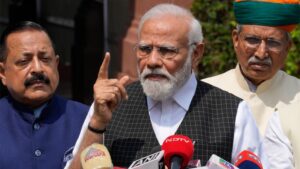We’ve got a bit more from Mick Whelan on why Aslef members have decided to strike.
He says:
We don’t want to inconvenience passengers, our friends and families use public transport, too, and we don’t want to lose money by going on strike but we’ve been forced into this position by the companies, who say they have been driven to this by the Tory government.
Many of our members, who were the men and women who moved key workers and goods around the country during the pandemic, have not had a pay rise since 2019.
With inflation running at north of 10% that means those drivers have had a real terms pay cut over the last three years.
We want an increase in line with the cost of living, we want to be able to buy, in 2022, what we could buy in 2021.
It’s not unreasonable to ask your employer to make sure you’re not worse off for three years in a row.
Especially as the train companies are doing very nicely, thank you, out of Britain’s railways, with handsome profits, dividends for shareholders, and big salaries for managers, and train drivers don’t want to work longer for less.
Wage rises aren’t fuelling inflation. Excess profiteering is, but the government isn’t asking companies to cut profits or dividend payments to help manage inflation.
Wages are chasing prices, not putting them up.
We don’t see why we should forego an increase in salary to keep pace with inflation and help the privatised train companies make even bigger profits to send abroad.
The striking drivers are all part of the Aslef union.
Aslef general secretary Mick Whelan said the strikes were “the last resort”, but many of his members had not had a pay rise for three years, despite working through the pandemic, and the high level of inflation meant they had taken a pay cut in real terms.
We regret the disruption caused. We understand that’s what happens when we take industrial action, but it’s in the hands of the companies to put this right.
As we just mentioned, West Midlands Trains is one of seven companies affected today.
But those companies operate more than seven services.
The other services experiencing issues are intercity services on LNER, which runs from London to Scotland via Leeds. That service will be vastly reduced. Great Western services will be severely curtailed. All Heathrow Express trains are cancelled and no GWR services will run west of Bristol into Wales.
A minimal Greater Anglia service, and just one Hull Trains service in each direction, will operate. No trains will run on Southeastern, and the majority of the London Overground services will also be stopped.
Other train operators such as Southern and Thameslink have warned that services could be crowded and disrupted as passengers switch to alternative services.
Good morning.
Across Britain, millions of people face rail disruption today as thousands of train drivers from seven operators strike in a dispute over pay.
The industrial action by members of the Aslef union represents the biggest strike by drivers in decades and will halt some train operators’ services.
Among the services affected is West Midlands Trains, which runs to sporting venues around Birmingham, the host city of the Commonwealth Games.
Rail bosses accused the union of targeting its action on the opening weekend of both the Games and the new English football league season.
We’ll bring you the latest developments on this story throughout the day.





